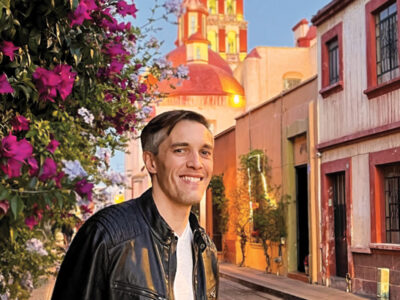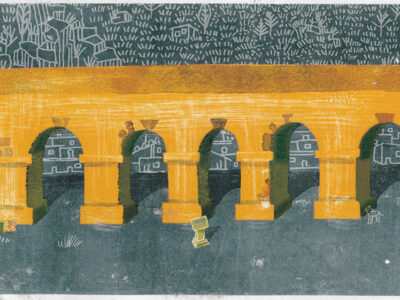
On walking at the spirit’s pace.
By Beebe Bahrami
Thirty-six summers ago, when I was 12 and visiting family in Iran, I wandered off with two girls from the mountain village where I was staying with cousins, just south of the Caspian Sea. We had gotten it into our heads to visit the neighboring village down the valley. It looked so close as we cast our eyes across the sinuous expanse. We set out with nothing more than a watermelon, which we took turns holding as one would an infant, and a pouch of pistachios.
It was farther than we’d thought, and we hadn’t anticipated the hard rain that would invade that dry summer day. Taking cover beneath a swaying bush, we cracked open our watermelon and polished it off as rain dripped along the bush’s skirt, allowing us to wash our hands. We compared notes on what it was like to grow up in their village and go to a one-room schoolhouse versus my life in a university town in Colorado. We then ate our pistachios, and soon the rain stopped.
We trudged on, three girls from different cultures finding common ground, finally marching into the village where one of the girls had a grandmother. We were soon seated in her living room, sipping hot tea and eating honey-soaked pastries. Elsewhere in the village, a phone call went out to three sets of anxious parents who had put out an all-points bulletin about their girls who had disappeared. Later, I learned that shepherds had kept their eyes on us to be sure no harm came our way.
Despite the worried looks on my mother’s and cousins’ faces, I knew I was born for trekking into the unknown; all I could think of was the fact that I would not have met that grandmother any other way. And I realized then that all across the world, there were people like her—kind and curious—whom I would never meet unless I walked through those remote places where the speed of feet was the speed of life, and of life revealing her secrets.
Many years later, I found myself on the train platform in Santiago de Compostela, Spain. Before me stood a tall and burly man with long, wild, curly blond-brown hair and a thick beard. It was his backpack, its rough-hewn khaki stained with dirt and oil, that drew me toward him. At least twice as big as most pilgrims’ packs, it had a tent and sleeping roll fastened at the bottom and a cooking pot, camper’s stove, water bottles, cup, and cooking utensils attached with hooks and loops. When he moved he sounded like a herd of cows coming home.
Soon we were seated in the same train car, chatting amiably. His name was Dieter. He had just finished walking the pilgrimage road to Santiago, the Way of St. James, from his front door in Lübeck in northern Germany. Five months earlier, his girlfriend had broken up with him. He had been working inordinate hours at a job while continuing fulltime studies. “I was devastated,” he said. “She was the woman I wanted to marry.” Dieter had closed the door to his apartment and to his life, and started walking.
I was still walking the pilgrimage, I explained in turn, but in a more nonlinear fashion. I’d just come from walking west of Ponferrada and was taking the train east to Pamplona to walk toward Burgos. I was filling in the spaces of unwalked portions.
For me, this walk was about finding out what would happen to my modern mind if I let my feet set the pace of its thinking. Our world has accustomed us to travel in superhuman leaps. We can jump in a car, a train, or a plane and be anywhere within a day. I wanted to slow down to witness transformation as it happened.
Dieter had walked more than 1,400 miles. He told me where the most profound part of his pilgrimage had occurred. “The great vast plains of Castile,” he said. “There, it was just me and my footfall. There were no mountains, hills, or rivers to distract my mind, just wide, open expanses. You can go mad. There, I found peace.”
I set out from Pamplona walking west. Perhaps because I had already been walking for some time, the vivid dreams came quickly, and each day on the trail was a deep inner journey set to a steady beat, parading unfinished business, powerful passions, long-term fears, and sudden intuitive insights as I climbed up and over one pass to the next.
Somewhere past Puente la Reina, I faced my grief over my grandmother; she had died the year before, taking with her so much of my childhood and that link to Iran. Beyond Estella, I reviewed the frightening dreams that came at night about my parents’ mortality and my own, knowing that one day I would also have to say good-bye to them. I reaffirmed my love for life by the time I reached Logroño, and curiously, I completely forgot my worries about making a living throughout my trek. Sometimes, an electric elation shot through me, from tailbone to skull crown, marveling that I was self-sufficient, strong-legged, and living simply by putting one step before the other. Each step took me deeper into a natural balance with life, and I dropped some heavy baggage along the path even as my backpack remained the same weight.
Outside Pamplona I met an Argentinean named Javier. As much as I was nonlinear in my walking, he was nontemporal in his. He would walk a week or two at a stretch, race back to classes in Pamplona, and set out again where he’d left off on the next set of vacation days. I saw him three more times on the trail before he got to Estella and had to take the bus back to Pamplona.
Once, Javier came upon me as I had just made it to the top of a rise and was watching a man on the trail below. The man was near an altar of trees and stone, pacing back and forth with a cigarette in his hand. He was speaking to himself or to some invisible entity. A shopping cart held his backpack and he had tied plastic bags filled with food and gear to the cart’s sides: a modern rendering of the medieval pilgrim’s donkey.
“I see you’ve met our permanent pilgrim,” said Javier as he arrived at the top of the rise.
“Really, he never leaves the Road?”
“Villagers and other pilgrims give him food and help him as they can. He walks back and forth along the path. This,” Javier swept his arms indicating the expanse of the entire pilgrimage road across northern Spain, “is his home.”
Dieter made his way home knowing that he would fall in love again. I, like Javier, would keep walking stretches of it as I could, excited by how the outer journey triggered a rich inner one. And out there was a man who was always on it, the world ever at his feet.
Years ago I assisted in the research for an exhibit called “The Gift of Birds” at the Penn Museum, on bird feather ornamentation gathered from South American indigenous people. Many of the items had been gathered by William Farabee in the early 20th century [“The Ethnologist Sets Out,” Sept|Oct 2007]. His expedition journals reside in the museum’s archives, and I spent hours poring over his accounts of walking into parts of the Amazon as yet unknown to outsiders.
Farabee described one day of challenging walking through unmarked forest, in the company of an indigenous group headed by an elderly man. They were from the area and had joined Farabee’s party when returning to their village after a big feast at another. Farabee and his small team were accustomed to walking fast, and found that their pace was slowed down by traveling with the guiding group. One morning, he was ready to move on but the elderly man refused, saying he had traveled so quickly the prior day that his spirit had yet to catch up, that he was waiting for it to arrive.
This phrase hit me hard and has ever since served as a guide for how to live and how to travel. In it, I think I discovered why I do not like to rent a car, or travel by adhering to a long list of places I must see. Those experiences have left me feeling like my spirit had yet to catch up. My spirit walked, took local buses and trains, connected to the land and the people who lived on it. That made it feel engaged and full.
When I walk at my spirit’s pace, my motion-hungry body and my over-stimulated brain simultaneously kick into a lower gear and go quiet, opening my awareness to the otherwise invisible details of everyday life. That’s when I see the little trail to the left, leading to a medieval village with a ruined Romanesque church, past whose unhinged door I discover Cistercian acoustic perfection as my voice beams off the walls. That’s when a red-breasted thrush alights on a branch right before me, and lets me look closely at his dark brown eyes and thick orange chest. That’s when a roadside café appears out of nowhere, with beer and ham sandwiches at just the right temperature, and an elderly man in a black beret who has the world’s best recipe for hard cider. The Homo sapiens body and brain I inhabit like to hunt and gather, which means paced movement and awareness of all that is around me. When I achieve the old rhythms, I find I am most content, not to mention the most alive.
Beebe Bahrami Gr’95 is a frequent contributor to the Gazette. She is at work on a time-traveling memoir, Café Oc, excavating southwestern France’s past and present.




